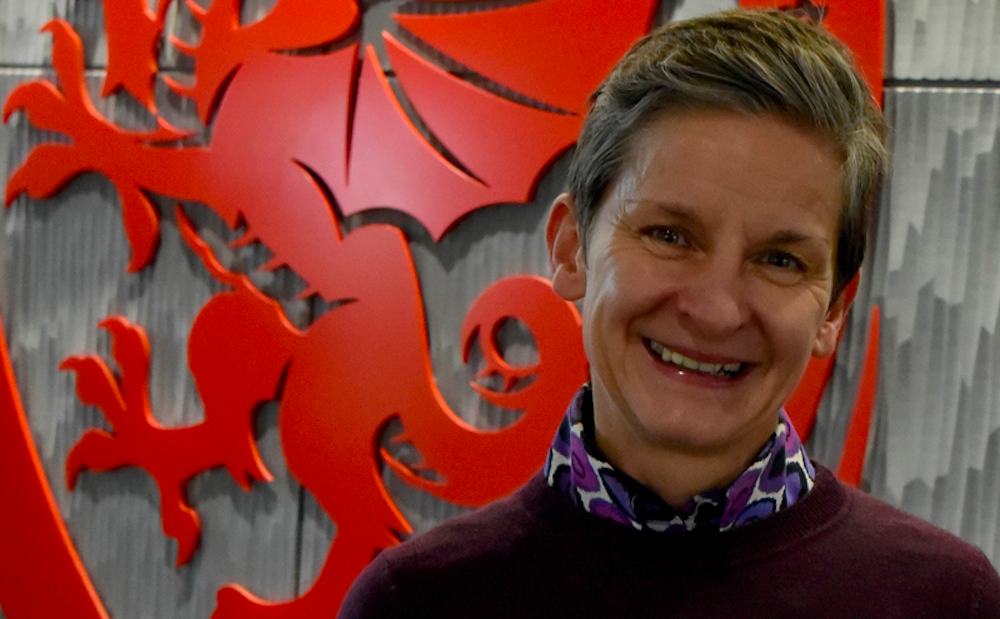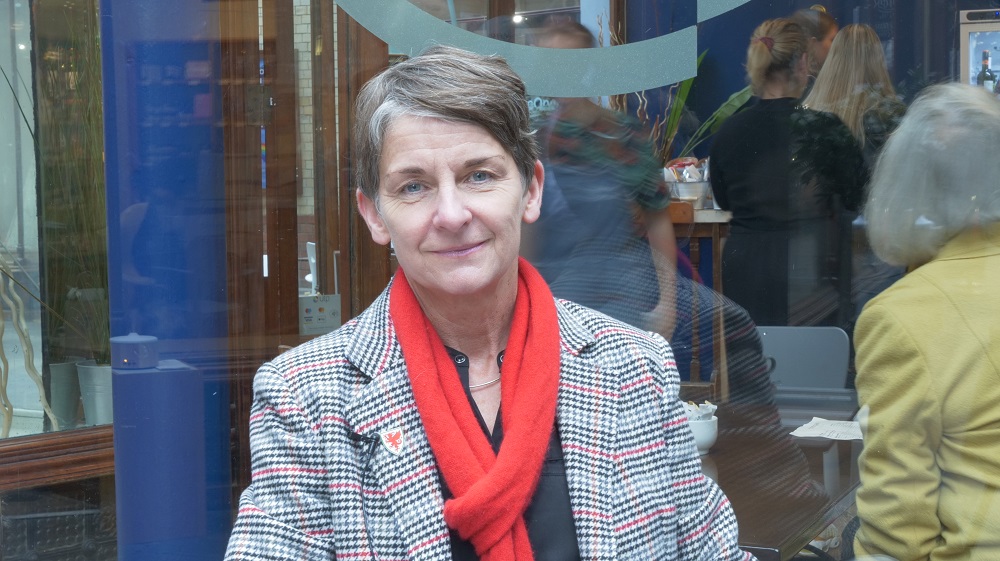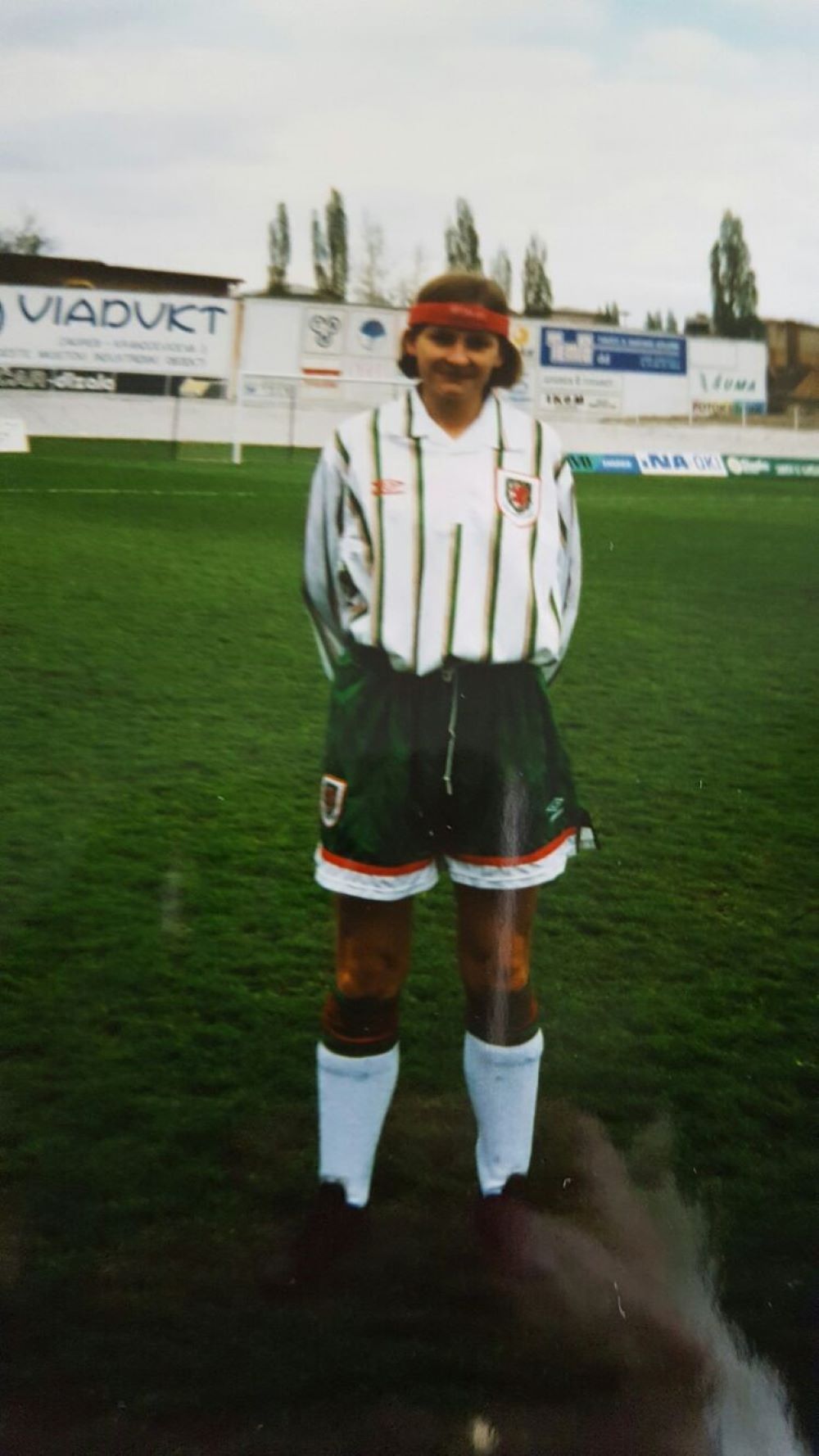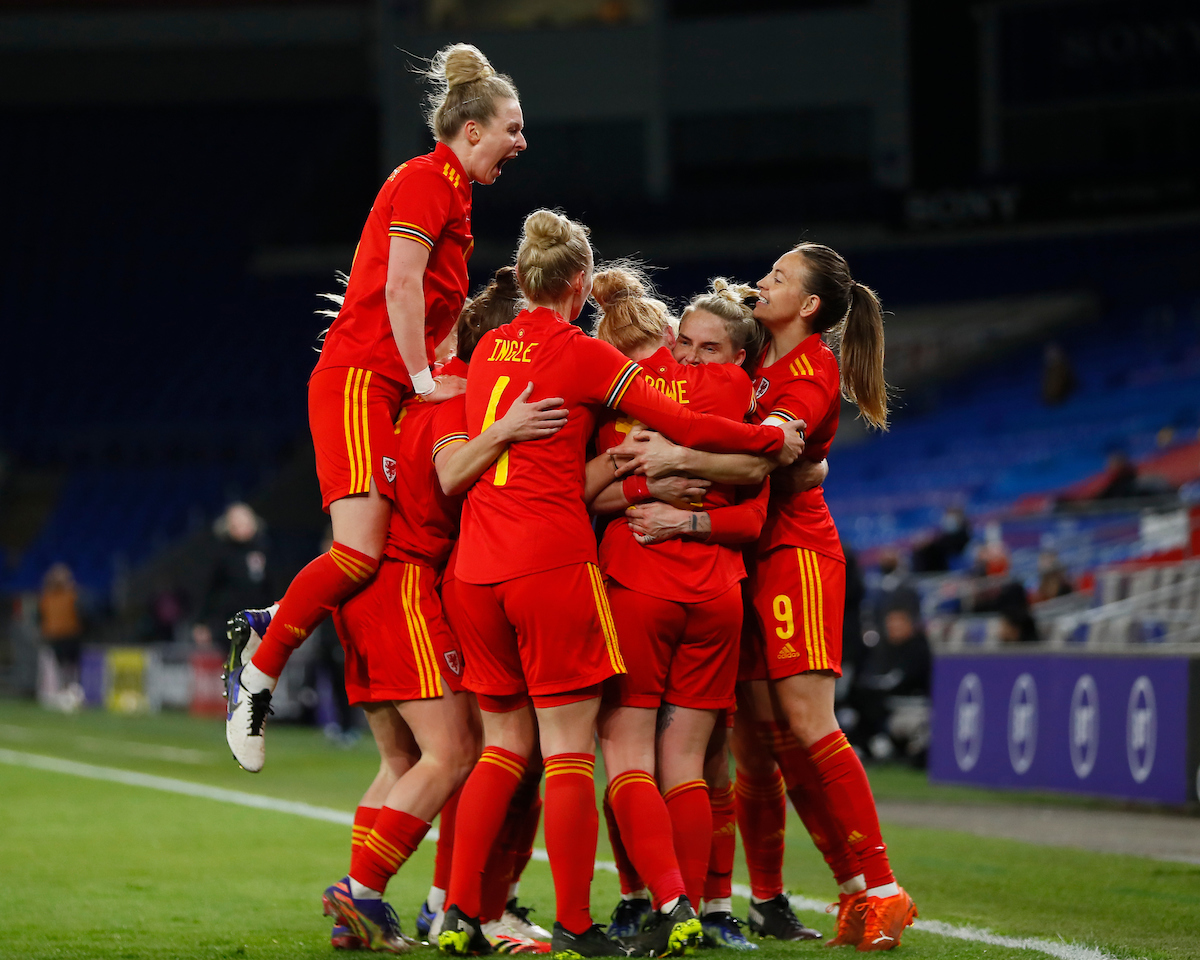Meeting Laura McAllister – the most influential woman in Welsh sport

When Laura McAllister speaks it’s always a good idea to listen. Her passion and ideas shine through.
Here Ryan March talks to the sporting trailblazer and former Wales football captain about her inspiring and hugely influential life in football, sport and politics.
You were born and raised in Bridgend, which has historically been seen as a ‘rugby town’. How did you get into football? What was the first moment that got you hooked on the game?
As it happened, I spent a lot of my childhood in Maesteg because my grandparents looked after us a lot in the week as we went to a Welsh school in Bettws, so I feel Maesteg was as much a part of my childhood as Bridgend was. My grandfather was very much into his football, he was a miner in Coegnant colliery and was part of the Llynfi Valley-Maesteg Cardiff City Supporters Club, so he took me to my first game when I was a toddler and I loved it straight away. I think my love of football is quite innate. I always loved the feeling of catching and kicking a ball and running around but I guess there’s always family influences as well. I went to hundreds of away games with my grandfather, we would catch the bus in Bridgend bus station and for most of the time at that age, I wouldn’t even know where we were going. We could be going to Carlisle or Hartlepool and it wouldn’t make much difference to me, I’d just get a bigger lunch box to take with me!
I always loved watching football and then I started playing, which was mainly with boys. I had a younger brother and lots of male cousins and we’d always find a space for a kickaround. I remember playing in the electricity yard with pylons for goalposts!
I’ve always been hooked on the game, there was never a single moment. It was a cocktail of watching Cardiff and then Wales in Ninian Park and playing informally. I remember reading every Shoot annual there was and the Observer Book of Football. I’d try and memorise all the ground names and the nicknames. I still remember them all now!
You spent the majority of your playing career with Cardiff City. What were the challenges of playing for a female football team in Wales at the time?
There wasn’t really a structure around the womens’ game at the time. It was very hard to play formally as there was no female team locally, so that avenue was closed. Nothing gives me greater pleasure to see how much that has changed since! When I went to university in London, I played lots of other sports like netball and hockey but I always really wanted to go back to playing the game I enjoyed most. I went along to Millwall and trained with them a few times and played in a few games, mainly friendlies. It was a great way to be introduced to club football, and when I came home to Cardiff after being in London for four years, I got hold of Cardiff City Ladies.
Two people who went on to be some of my closest friends, Karen Jones and Michelle Adams were running the club, they still do to this day. It was great, it had a proper structure with a good set up. It wasn’t perfect, we were still playing on council park pitches but it was much more organised than when I had been playing in Wales as a teenager. The challenges then were different to now, there wasn’t much overt sexism but there was deep rooted cynicism and structural opposition to female footballers. It was hard to get pitches, referees and sponsors because nobody took the game seriously. The irony is that the players I played with in that era (end of the 80s into the 90s) were actually technically as good as the players you see now playing for Wales yet because there was no coaching like there is today, they weren’t as developed but in terms of raw technical ability they were certainly just as good.

Despite Wales not having an official women’s team, did you play any games as ‘Wales’ before you were recognised by the FAW?
There was a Wales team before my time, I knew some of the girls who had played. Karen and Michelle were two of them, Leslie Judd, Wendy Riley and some of the girls who did go on to play for the FAW recognised team. I think it’s really important that they are seen as the pioneers of the game. They did it all autonomously, they took on the responsibility of organizing the squad and the trials and the kit and all the travel and accommodation all off their own back without any money. Although Karen, Michelle and I were the ones that went along to see Alun Evans in the FAW when he was general secretary, we were all following the footsteps of some fantastic ambassadors and champions of the game who went before me. So by the time we did go to lobby Alun Evans, I think there’d been two decades of women organising a Wales team independently and they’re the ones we owe most debt for where we are now.
You played an instrumental role in establishing a recognised Welsh women’s team in 1993. What was the process that led up to it becoming a reality?
All I was doing during this time was adding my bolshy voice to a process that was already underway. When you think about it, it’s absolutely crazy. It wasn’t a century ago, we’re talking 30 odd years ago at a time when Terry Yorath was in charge of a men’s team who were on the verge of qualifying for the World Cup and the FAW had no interest in the women’s game. It struck me as fundamentally biased and unfair. It felt like something we should lobby against.
In fairness to Alun Evans, who has had a mixed press, let’s say, he did a lot for women’s football and without his intervention and all the support and funding we wouldn’t be anywhere near where we are now. Yes, it could have happened sooner and yes, it could’ve happened faster but I think we need to pay tribute to Alun who was one of the people who was really instrumental in generating change in the women’s game in Wales.
You made your debut for Wales in their second ‘official’ game, a 12-0 defeat to Germany. Despite the result, how did it feel to finally represent your country in a recognised international?
I made my debut in the second official game out in Bielefeld in Germany. The emotion of playing for your country is something you can never replicate in anything else you do. Apart from family joys, professionally this is without the shadow of a doubt the best experience anyone can have in their life. It’s the most emotional, the most meaningful and the most connected you can feel with your country. As Gareth Bale has said so articulately “the dragon on my shirt, that’s all I need”.
I never felt fearful playing for Wales, there were obviously nerves but never any fear. The result in that game was no disgrace and I don’t feel embarrassed by that at all because that’s where the game was at the time. We were amateurs without any preparation going into a match against the equivalent of full time pros with a proper set up. It doesn’t take anything away from the pride that we all had playing for Wales.

You’ve been involved in politics and sport in Wales throughout your adult life. How important can sport, and in particular football, be in influencing politics in Wales?
I think sport and especially football can be critical in influencing politics. In the wider sense, it can influence the profile and reputation of Wales across the world.
I think there’s an argument for sports diplomacy and how we can use the brand of Welsh football to sell Wales to the world. People like Jess Fishlock, Sophie Ingle, Aaron Ramsey and Gareth Bale are global superstars and we probably don’t coalesce a strategy around that effectively enough. It’s not just football but our commonwealth games athletes and our rugby team, people like Aled Siôn Davies and Jade Jones are globally known and we haven’t really developed an adequate strategy to use that.
Government needs to be less prickly about sport in all honesty. Sport gets a Cinderella treatment from the government, we’ve always had a very small budget and it’s regarded as being for sport, as if sport is purely about competitive play on the field and nothing else, but the social and economic impact of sport can be vast. It’s a preventative mechanism that saves money for the NHS, it benefits mental health and wellbeing and its spin off economically is phenomenal.
I think the government is late to the party in understanding that. Organisations like Public Health Wales should be aligning themselves very closely with the work we do in sport and in football because it would be a massive intervention of a preventative nature. So instead of the NHS being a sickness service, which it is at the moment, it could become a wellness service to prevent people becoming ill by being physically active. This should start when children are very very young so they become more physically literate, more able and generally more in tune with their bodies and personal responsibilities for being fit, well and healthy.
Confidence
In your opinion, what do you think Euro 2016 meant to Wales as a nation and what will be it’s legacy
It was definitely enormous for us as a nation. I think more so internally than externally in my opinion because it gave us that sense of self. We tend to juxtaposition ourselves against England but I think that gave us the confidence to say it’s got nothing to do with them. I know people say our fans behaved better and yes, of course they did but it wasn’t about that, it was about saying we are a European nation in our own right, we’re an independent football nation even if we aren’t an independent political country.
Euro 2016 gave us an opportunity as a nation to go toe to toe with other countries but it was more than that. It was a way of embracing the world and embracing everything that Wales is about and boosting our own self belief and confidence as well. I think the legacy is that sense of who we are as a people and feeling confident and outward looking rather than seeing ourselves in contrast with England. I’ve never been into that really, I’ve got no interest in what’s going on in England unless we can learn from it in sport. They’re just another country that happens to be nearby and because they are so big the lessons tend to be less transparent and obvious to us. I tend to look more towards the countries that are slightly bigger than us like Sweden, Denmark, Serbia or Portugal. Countries where their development has been stronger than ours and we can take useful lessons from. So I’m not particularly interested in England and I don’t want to compare ourselves to England, that’s irrelevant in my opinion, and that applies to the women’s game as well.
The women’s game in Wales is going from strength to strength, recently breaking the attendance record and with bonafide stars like Sophie Ingle and Jess FIshlock spearheading the current team, the future looks bright. What does the women’s game in Wales need now to go to the next level?
Following on from my last answer, one thing I will say is that we’re fortunate to have England as our neighbours when it comes to women’s football because of the Women’s Super League, which is a professional league and that helps our athletes no end.
I would love to have a Welsh team in the WSL. It’s a big ask at the moment but it’s something that we need to think about because it would be a way of bringing together some of our Welsh players. What is equally important is developing the Adran League to make sure the infrastructure is there for young players in Wales. Developing the youth side of the game is as important as anything to me.
It’s great that Sophie and Jess care so much about qualifying, and not just for themselves. What is different in the women’s game is that the players are political, they aren’t frightened to speak their mind. They appreciate their status as role models and not just in the development of the game. You wouldn’t necessarily have a player in the men’s game talking about homophobia and their personal experiences, mainly because there’s no openly gay players here, which is completely ridiculous. In the women’s game, the girls embrace their status as role models and activists. I wouldn’t be at all surprised if some of the girls went into politics when they finish playing. I think that’s brilliant because football is a vehicle rather than a destination. You can only really do it until your late 30s so you’ve got to have another career plan, so why not politics? I think Jess Fishlock, Tash Harding or Helen Ward would make great MSs or even play an important role in the governance of the game.

You recently ran for election for the FIFA council but unfortunately you were unsuccessful. Is that something you will revisit in the future and what is the ‘Laura McAllister vision’ for the game?
I was really fortunate coming from a background of politics and football. I think it’s a pretty advantageous cocktail to have to be able to fight an election for a senior position in the governance of the game. Don’t get me wrong, I was so disappointed to lose that election, especially after coming so close. We had 40% of the vote, and as a first time candidate coming up against not only a powerful nation, but an incumbent, was really impressive. Evelina Christillin, my opponent from Italy, had only served one term. A few countries told me they felt they had to support her because they felt she was entitled to a second term, such is football governance. To get within six votes of winning is a bit of an earthquake in all honesty. I think we were able to tap into the Zeitgeist of where women in football are at the moment.
I positioned myself as the “football candidate”, someone who knew the game and that’s really critical because the battles we’re fighting in governance are because we don’t have women involved at that level. There aren’t enough “football women” at the top level who care about developing the game and who know the sport. If I’m being really honest, we are the women who are feared most and will find it hardest to be elected. It’s far easier to bring in a woman who doesn’t know much about the game because they’re more easily controlled and, dare I say, manipulated by some people who would pay lip service to the women’s game but don’t want it to really change or have too much influence.
I want to stand again, and probably will stand again. But this isn’t about me, I know that the election has paved the way for change in terms of women’s representation and if I get the chance to run again and win then that’s wonderful, but it won’t have been a failure if that doesn’t happen because there will be women who come afterwards whose paths would’ve been made easier because of me contesting the election and standing as a football candidate. I hope I’ve been able to leave a mark on UEFA and FIFA and even if I don’t have a role with them in the future, it won’t stop me from contributing in Wales and paving the way for others in the future.

How has your relationship with football changed over the years as you’ve gone from playing to governance, but also as a fan?
My relationship with watching Wales hasn’t changed one bit. I love every second of it, it’s my biggest passion outside my family and my work. My relationship with Cardiff City has definitely changed though and I do try and evaluate that at times. I care so much less about the club now and I try to work out why. It’s not been helped by pretty abysmal football over the past six or seven years. Let’s be fair, even during the promotions we were playing awful football and quite rightly came straight back down from the Premier League. Promotions don’t really matter to me, I’m more interested in the quality of football and the relationship that I have with the club. The red shirt fiasco damaged not just my feelings for the club, but lots of others. It was a ludicrous, outrageous decision. Going back to blue never really repaired that damage.
Let’s hope it gets better with the new management team. Another aspect is the fact we haven’t really had many Welsh players coming through and it’s been great to see players like Isaak Davies and Rubin Colwill in recent months, that’s something that has always been really important to me. I’d like to like Cardiff more because I’ve been a season ticket holder since I was four years old but in all honesty, Wales gives me my emotional fix in football now. We’ve got a World Cup play-off to look forward to and hopefully we’ll have another route with the women’s side. I feel like this is their moment, the blend of experience and youth in this squad makes this the right time. Qualification will be a game changer for the women’s game, like it was for the men. Who knows, we could be in two World Cups and I’ll be at both of them!
I also love the fact that Welsh football is so political and it’s a shame it isn’t the same in other aspects of Welsh life. Hopefully politics can learn from sport. I like the fact that fans are political, I like the fact we’re trying to tackle issues like homophobia and racism but more than that, there are conversations about the governance and politicians of Wales. I think that’s really important. Things like this are critical for elevating Wales on the world stage and creating a self-belief in us as a people.
This article first appeared in the latest issue of football culture fanzine Alternative Wales.
Find out more about Alternative Wales and subscribe HERE
Support our Nation today
For the price of a cup of coffee a month you can help us create an independent, not-for-profit, national news service for the people of Wales, by the people of Wales.







1st Welsh president!. Arwres
A joint presidency with Micheal Sheen possibly